Silas House's Blog, page 2
July 4, 2019
The Complications of Freedom-A short excerpt
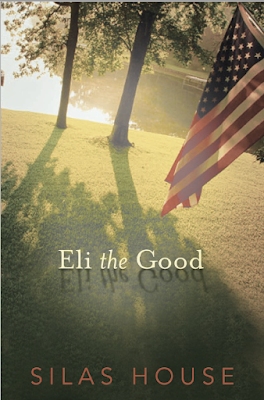 Huge showers of red and yellow and green and blue and white exploded on the sky, blossoming like giant willow trees. The booms were huge and square-sounding, echoing several times down the hills lining the river. Between explosions, blue smoke hung on the sky.
Huge showers of red and yellow and green and blue and white exploded on the sky, blossoming like giant willow trees. The booms were huge and square-sounding, echoing several times down the hills lining the river. Between explosions, blue smoke hung on the sky.After a while, a sort of reverent silence fell upon us. All the children stopped running about and screaming, and everyone became still. Perhaps we were all understanding that we had been free for two hundred years, or as free as people can possibly be. I like to think that everyone was filled with a brief melancholy, a moment in which we took into account everything we had, and appreciated it all, and felt blessed and lucky to have been born in this country, in this time and space. Or maybe everyone was taking into account all of the wrongs done to others to gain this freedom, the freedom that had been taken from others for our gain.
My sister Josie...looked up at to the sky. Then she whispered to me: "I wonder if anybody else is thinking of the Indians, and the slaves, and the immigrants, and the way soldiers got sent off to die." Her eyes touched mine. "Do you think they are?"
"I don't know," I said, very quiet, as if speaking too loudly might break some spell that had befallen us.
"I keep thinking about this thing I learned in history class last year," she said, watching the sky now. Her face went rose-tinted with the blast of firework. "At Gettysburg, these soldiers got sent into battle and they knew they were gonna die, but they went anyway. Now that's being brave," she said. "So what they did is, they wrote these short little letters to whomever they loved. And the best part is that they tied or nailed the letters to the trees."
I could picture this: a woods above the battleground, decorated by hundreds of little papers filled with cramped, old-times handwriting. "You know who I think about?" she said. "The soldiers who had to go and collect the letters off the trees the next day."
I looked out over the crowd, the faces being lit by all the different colors of the explosions, and wondered what they were thinking in this big silence that had spread over all of us. So many complicated thoughts and emotions and secrets. For a little while I felt like I was kin to everybody there, all connected by this night, this nation.
Published on July 04, 2019 07:20
April 7, 2019
No One Can Make You Feel Inferior Without Your Consent

This was in 1992. In the foreground is CNN anchor Bernard Shaw, who at the time was one of the most famous journalists in the world after narrating most of the Gulf War to us.
That’s me right above his head. At the time I was editor of my college newspaper and our wonderful faculty advisor, Susie Bullock, took us to see Shaw when he came to the University of Kentucky to give the Creason Lecture. That night when I spoke to Shaw he said “With a voice and accent like that you have a future in journalism.”
Only a couple months before a judge at a journalism conference had told me I’d never get anywhere with my accent despite my perfect grammar. “That hillbilly talk makes you sound like an idiot,” the judge said.
Less than ten years after this picture was taken I became a contributor to NPR’s “All Things Considered”. Since then I’ve published seven books and been on a lot of TV and radio, appeared in and narrated documentaries, done commercial narration, and narrated an audio book that won the highest award an audio book can win.
Obviously, I still remember what both the judge and Shaw said. The judge’s small-minded rudeness made me more determined. Shaw’s encouragement was always a whisper in my ear. Nowadays I am thankful for both.
---
Notes:
The title of this flash essay is from a quote by Eleanor Roosevelt.
The judge was encountered at the Kentucky Intercollegiate Press Association Conference and also served as a journalism professor for a prominent Kentucky university.
One of my NPR "ATC" pieces can be found here.
Among the documentaries I've appeared in are Hillbilly, Class of 27, and Deep Down . The most recent film I've narrated is Calling It Quits .
The Audie is the highest award for audio books. In 2013 the winner for Children's/YA Audio Narration of the Year was Silas House and Neela Vaswani for Same Sun Here.
Published on April 07, 2019 11:39
February 24, 2019
My Unsolicited Opinions on The Oscars
My quickly written but passionate thoughts about the Oscars.
Rural Erasure, As AlwaysAs always, the films that portrayed rural people with dignity and complexity were overlooked almost completely. Hollywood, like the literary gatekeepers in New York, won’t allow rural complexity to get too much attention or acclaim or it might be admitting that the sensational stereotypes aren’t truer. This year there were three that painted rural people beautifully—not as perfect, but as real human beings. They were: Leave No Trace, First Reformed, and Lean on Pete, and they are all films that were absolutely cheated out of Oscar nominations. I think it’s partly because of the rural complexity on display in the films. Although the characters live in small rural towns, they are intelligent, engaged, and complicated. Last year, my favorite movie of the year, The Florida Project was similarly overlooked, and I think that’s mostly because it’s maybe the most accurate and complex portrayal of poverty that I’ve ever seen. This year, I think Lean on Pete gives a similarly complex look at class issues and it does so by displaying really interesting and complex rural people. Don’t miss it (Currently on Prime).
Women Directors Erasure, As AlwaysDebra Granik (Leave No Trace) and Marielle Heller (Can You Ever Forgive Me?) should absolutely be on that Best Director list.
An Overrated Star Send me your hate mail now because I’m going to say it: A Star is Born is overrated. I thought the first hour was electric, mostly because of Lady Gaga’s performance. The scene where she sings “Shallow” is one of the best scenes of the year. But once the film slides into her descent into bad pop music it becomes Bradley Cooper’s film. And although lots of people love him in it, I found him painful to watch (and to hear--his voice sounded like gravels in a blender). To me he’s doing nothing more than a bad impersonation of Sam Elliot with some Kris Kristofferson thrown in and by the last half hour (SPOILER) I was hoping he’d go ahead and die so I could leave.
Best SongWith that said, “Shallow” is a great song and I hope it wins best song, although I love the Mary Poppins song, too, and I’m tickled that Gillian Welch and David Rawlings—two of my favorite singer-songwriters—are up for “When a Cowboy Trades His Wings for Spurs” from one of my favorite films of the year, The Ballad of Buster Scruggs. But Lord, who knows what kind of garbs those two will wear to the ceremony.
Speaking of Best Song, Dolly Parton has once again been screwed over by the Academy. In the past she’s been nominated for “9 to 5” (which she lost in 1981) and “Travelin’ Thru” (which she lost in 2006 to “It’s Hard Out Here on a Pimp”, which isn’t exactly a song that is remembered for being great). She was longlisted this year for “Girl in the Movies” but didn’t make the final cut, which is outrageous. Personally, I think “Red Shoes” and “Here I Am” were both superior cuts on the Dumplin’ soundtrack but the point is that Dolly Parton should already have at least three Oscars and this year she’s not even nominated. It ain’t right.
Best ActressDevotees of Lady Gaga will likely riot if she doesn’t win Best Actress but if Glenn Close doesn’t win for The Wife then I’ll write a firmly worded tweet. Her performance is the only one this year that rivaled Olivia Colman's in The Favourite for me. And I think Colman can do no wrong. Close’s role was a harder one to pull off, though, with all of that fury boiling just below the surface for such a huge chunk of the film. She does almost all of the best parts of her performance in The Wife without words, instead using her eyes to convey every bit of information to us that we need. With all of that said, I think The Favourite is the film that will be watched in 25 years, while The Wife will not be.
Best ActorThe fact that Ethan Hawke didn’t get nominated for best actor reaffirms my notion that awards so often get it wrong.
Best PictureOf the nominated films, I have been most visually haunted by Roma (that scene at the end in the ocean is the most moving thing I saw on film this year) and I think I was most outright entertained by The Favourite. I thought Bohemian Rhapsody was a great popcorn entertainment but that’s all. It shouldn’t be up for Best Picture (especially when movies like Lean on Pete, Leave No Trace, Can You Ever Forgive Me?, The Ballad of Buster Scruggs, and First Reformed were knocked out of spots by it). The producers obviously set out to make a crowd pleasing hit (otherwise, why not complexify and eroticize Mercury’s gayness?) and that’s what they did. But they didn’t create a film that is a great production.
SupportingsI wanted so badly to love If Beale Street Could Talk. I did not. I thought it was absolutely beautiful to look at: the cinematography, the production design, the set design, the costume design. But I never connected with it and I was even bored with it as a story (but not by its visuals). I never really cared about the characters. Regina King is masterful in everything she does (her performance in the TV miniseries Seven Seconds is one of the best I’ve ever seen in my life) and I think she’ll win the Oscar but I don’t think she deserves it for this role. Rachel Weisz should get it for The Favourite, but she likely won’t.
I think Mahershala Ali is absolutely wonderful in Green Book but my favorite supporting actor this year was Richard E. Grant in Can You Ever Forgive Me?, who manages to give great complexity to a role that could have so easily been stereotypical.
A few other notes on movies this year:I can’t believe Won’t You Be My Neighbor wasn’t nominated for Best Documentary. But I’ll be very happy if RBG wins. I loved it. And They Shall Not Grow Oldis the most effective documentary I saw this year. A collection of old news reel footage of WWI battles that has been masterfully colorized by Peter Jackson’s team, it’s a shame it didn’t get recognition.
I hated the film Vice with a passion. It’s smarmy, offensive in its myth-making, and doesn’t tell me anything I didn’t already know about Dick Cheney. I thought Christian Bale’s performance was nothing more than mimicry although it seems transformative just because the makeup crew did such an amazing job on him (hopefully they will be the only Oscar recipients on the Vice team). Amy Adams is the only great thing about it. My eyes nearly rolled out of my head when they broke into that scene of faux-Shakespeare dialogue. Adam McKay being up for Best Director just shows the power of a great publicist in awards races. I actually felt dirty when I left this film.
The French film The Guardians was one of my favorites this year and should have been up for Best Foreign Picture. You can watch it on Prime.
I loved everything about Mary Poppins Returns. Everything. Well, I could have done without the scene that features Meryl Streep (the only scene in the movie that felt inserted) but otherwise it was practically perfect in every way. Especially Emily Blunt, who is always wonderful.
Well, everyone has an opinion and these are mine. It is likely that many people will disagree with me. That's what makes Oscar night fun, even though we all know that in the end awards don't mean as much as things like family, dogs, books, or the films themselves. Art is always better than awards.
Rural Erasure, As AlwaysAs always, the films that portrayed rural people with dignity and complexity were overlooked almost completely. Hollywood, like the literary gatekeepers in New York, won’t allow rural complexity to get too much attention or acclaim or it might be admitting that the sensational stereotypes aren’t truer. This year there were three that painted rural people beautifully—not as perfect, but as real human beings. They were: Leave No Trace, First Reformed, and Lean on Pete, and they are all films that were absolutely cheated out of Oscar nominations. I think it’s partly because of the rural complexity on display in the films. Although the characters live in small rural towns, they are intelligent, engaged, and complicated. Last year, my favorite movie of the year, The Florida Project was similarly overlooked, and I think that’s mostly because it’s maybe the most accurate and complex portrayal of poverty that I’ve ever seen. This year, I think Lean on Pete gives a similarly complex look at class issues and it does so by displaying really interesting and complex rural people. Don’t miss it (Currently on Prime).
Women Directors Erasure, As AlwaysDebra Granik (Leave No Trace) and Marielle Heller (Can You Ever Forgive Me?) should absolutely be on that Best Director list.
An Overrated Star Send me your hate mail now because I’m going to say it: A Star is Born is overrated. I thought the first hour was electric, mostly because of Lady Gaga’s performance. The scene where she sings “Shallow” is one of the best scenes of the year. But once the film slides into her descent into bad pop music it becomes Bradley Cooper’s film. And although lots of people love him in it, I found him painful to watch (and to hear--his voice sounded like gravels in a blender). To me he’s doing nothing more than a bad impersonation of Sam Elliot with some Kris Kristofferson thrown in and by the last half hour (SPOILER) I was hoping he’d go ahead and die so I could leave.
Best SongWith that said, “Shallow” is a great song and I hope it wins best song, although I love the Mary Poppins song, too, and I’m tickled that Gillian Welch and David Rawlings—two of my favorite singer-songwriters—are up for “When a Cowboy Trades His Wings for Spurs” from one of my favorite films of the year, The Ballad of Buster Scruggs. But Lord, who knows what kind of garbs those two will wear to the ceremony.
Speaking of Best Song, Dolly Parton has once again been screwed over by the Academy. In the past she’s been nominated for “9 to 5” (which she lost in 1981) and “Travelin’ Thru” (which she lost in 2006 to “It’s Hard Out Here on a Pimp”, which isn’t exactly a song that is remembered for being great). She was longlisted this year for “Girl in the Movies” but didn’t make the final cut, which is outrageous. Personally, I think “Red Shoes” and “Here I Am” were both superior cuts on the Dumplin’ soundtrack but the point is that Dolly Parton should already have at least three Oscars and this year she’s not even nominated. It ain’t right.
Best ActressDevotees of Lady Gaga will likely riot if she doesn’t win Best Actress but if Glenn Close doesn’t win for The Wife then I’ll write a firmly worded tweet. Her performance is the only one this year that rivaled Olivia Colman's in The Favourite for me. And I think Colman can do no wrong. Close’s role was a harder one to pull off, though, with all of that fury boiling just below the surface for such a huge chunk of the film. She does almost all of the best parts of her performance in The Wife without words, instead using her eyes to convey every bit of information to us that we need. With all of that said, I think The Favourite is the film that will be watched in 25 years, while The Wife will not be.
Best ActorThe fact that Ethan Hawke didn’t get nominated for best actor reaffirms my notion that awards so often get it wrong.
Best PictureOf the nominated films, I have been most visually haunted by Roma (that scene at the end in the ocean is the most moving thing I saw on film this year) and I think I was most outright entertained by The Favourite. I thought Bohemian Rhapsody was a great popcorn entertainment but that’s all. It shouldn’t be up for Best Picture (especially when movies like Lean on Pete, Leave No Trace, Can You Ever Forgive Me?, The Ballad of Buster Scruggs, and First Reformed were knocked out of spots by it). The producers obviously set out to make a crowd pleasing hit (otherwise, why not complexify and eroticize Mercury’s gayness?) and that’s what they did. But they didn’t create a film that is a great production.
SupportingsI wanted so badly to love If Beale Street Could Talk. I did not. I thought it was absolutely beautiful to look at: the cinematography, the production design, the set design, the costume design. But I never connected with it and I was even bored with it as a story (but not by its visuals). I never really cared about the characters. Regina King is masterful in everything she does (her performance in the TV miniseries Seven Seconds is one of the best I’ve ever seen in my life) and I think she’ll win the Oscar but I don’t think she deserves it for this role. Rachel Weisz should get it for The Favourite, but she likely won’t.
I think Mahershala Ali is absolutely wonderful in Green Book but my favorite supporting actor this year was Richard E. Grant in Can You Ever Forgive Me?, who manages to give great complexity to a role that could have so easily been stereotypical.
A few other notes on movies this year:I can’t believe Won’t You Be My Neighbor wasn’t nominated for Best Documentary. But I’ll be very happy if RBG wins. I loved it. And They Shall Not Grow Oldis the most effective documentary I saw this year. A collection of old news reel footage of WWI battles that has been masterfully colorized by Peter Jackson’s team, it’s a shame it didn’t get recognition.
I hated the film Vice with a passion. It’s smarmy, offensive in its myth-making, and doesn’t tell me anything I didn’t already know about Dick Cheney. I thought Christian Bale’s performance was nothing more than mimicry although it seems transformative just because the makeup crew did such an amazing job on him (hopefully they will be the only Oscar recipients on the Vice team). Amy Adams is the only great thing about it. My eyes nearly rolled out of my head when they broke into that scene of faux-Shakespeare dialogue. Adam McKay being up for Best Director just shows the power of a great publicist in awards races. I actually felt dirty when I left this film.
The French film The Guardians was one of my favorites this year and should have been up for Best Foreign Picture. You can watch it on Prime.
I loved everything about Mary Poppins Returns. Everything. Well, I could have done without the scene that features Meryl Streep (the only scene in the movie that felt inserted) but otherwise it was practically perfect in every way. Especially Emily Blunt, who is always wonderful.
Well, everyone has an opinion and these are mine. It is likely that many people will disagree with me. That's what makes Oscar night fun, even though we all know that in the end awards don't mean as much as things like family, dogs, books, or the films themselves. Art is always better than awards.
Published on February 24, 2019 08:41
December 28, 2018
Favorite Books of 2018
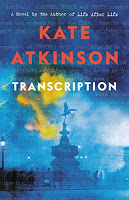 I read 36 books this year (not counting the books I read for blurbs, workshops, etc.). Someone told me yesterday that they don't read because they don't have time. Only a nonreader would think that's a valid excuse. That person certainly has more time on their hands than I do but I still managed to devour almost forty books (and I'm a pretty slow reader, I think). We readers know that one makes time to read. It's not a choice. We're not happy if we're not doing it.
I read 36 books this year (not counting the books I read for blurbs, workshops, etc.). Someone told me yesterday that they don't read because they don't have time. Only a nonreader would think that's a valid excuse. That person certainly has more time on their hands than I do but I still managed to devour almost forty books (and I'm a pretty slow reader, I think). We readers know that one makes time to read. It's not a choice. We're not happy if we're not doing it.Here are twenty-one of my favorites from that pile (in alphabetical order by author's last name).. Books that were published this year have a * by them. I'm always hesitant to make lists because they're so objective and really only reveal the taste of the reader. Most of the big magazines and awards failed to recognize many of the books I found the best and lauded several other books that I struggled to finish. Often I see books that are incredibly hyped and realize that I just don't get it. Other times, the hype gets it exactly right, as happened with a couple of my favorites on this list. But most of all I think we can't look to others and compare ourselves to what they deem as the best--we have to just love what we love. The older I get, the more comfortable I am with not listening to the reviewers or prizes as much as I just listen to other readers I trust, or, even more often, I trust my own instinct on choosing books. And most of the time my gut gets it right.
Transcription-Kate Atkinson*
-Doesn't quite compare to her masterpieces, Life After Life and A God in Ruins, but I couldn't put it down and especially loved the way it put me in the London of the 1940s and 1950s.
A Ladder to the Sky-John Boyne*
-Not nearly as good as my favorite of his, The Heart's Invisible Furies, but this was one of the most readable and suspense-filled books I've ever read. It's The Talented Mr. Ripley meets the cutthroat literary world.
The Absolutist-John Boyne
-Few authors can sweep you away to a particular time and place like Boyne can, and this is one of his best.
The War I Finally Won-Kimberly Brubaker Bradley*
-I loved The War That Saved Me and this sequel was nearly as good. These are characters I came to really love and I was so glad to see this continuation of their story in war-torn England.
On the Black Hill-Bruce Chatwin
-The story of twin brothers who live in a house straddling the English-Welsh border is one of the most beautifully written novels I've ever read. It's a very well-known novel in Great Britain but barely read here in America. That should change.
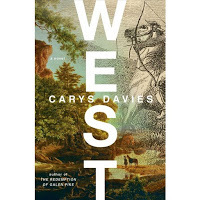 West-Carys Davies*
West-Carys Davies*-This is the best novel I read this year. Despite being only 160 pages long, it is a complete epic and
it's the book I continue to think about. The prose is efficient yet elegant. The images stay with me. The characters are heartbreaking and vivid. This novel about the dangers of obsession is a master-class in novel-writing and I've been stunned to find that it has been barely mentioned on any Best-of lists nor won any major awards this year. A criminally overlooked and underrated novel that made me envy the author's powers.
Louisiana's Way Home-Kate DiCamillo*
-I've always loved DiCamillo and this story about a young girl trying to find a home is one of her best. Charming without ever being cloying, moving without ever being sentimental. I loved everything about it.
Varina-Charles Frazier*
-Ambitious and lyrical, simultaneously intimate and epic. This is one of Frazier's best.
Less-Andrew Sean Greer
-I think this is a pretty perfect novel. I laughed, I was moved, and most of all, I really cared about what happened to Arthur Less. Much was made of this comedic novel winning the Pulitzer Prize--a real feat, since the prize usually goes to much more serious fare--but it completely deserved it. Also, I think it possesses one of the best structures in a novel I've ever read.
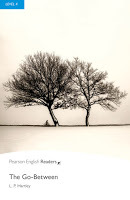 The Go-Between-L.P. Hartley
The Go-Between-L.P. Hartley-This classic novel from the 1960s still holds up despite having been copied by a legion of writers, especially people like Allan Hollinghurst and Julian Barnes (both of whom I love).
Treeborne-Caleb Johnson*
-Announces a major new voice in Southern Literature. You can taste the peaches and feel the heat in this lyrical and witty study of an eccentric and unforgettable Alabama family.
Unsheltered-Barbara Kingsolver is doing some very difficult things in a novel filled with laughter and tragedy, expertly floating back and forth between a family suffering through the most recent presidential election and a female scientist in the 1800s.
The Outrun-Amy Liptrot
-The only memoir on my list this year, and one of the best ones I've ever read. I didn't think I'd actually want to read another memoir about addiction but Liptrot makes it into something completely new and fresh, especially by finding her healing in studying birds and the world itself.
The Overstory-Richard Powers*
-There were sections of this novel that were some of the most powerful and beautiful I've ever read. Truly breathtaking scenes, some of which were actually life-changing. I was often frustrated by the book (too many characters, some sections are too long) but overall I think it's an amazing novel and it has completely changed the way I look at the natural world.
The Guernsey Literary and Potato Peel Society-Mary Ann Shaffer & Annie Barrows
-This book is a complete confection, and I mean that in a wholly positive way. Compulsively readable, suspenseful, with a sense of place so vivid it made me want to visit Guernsey and characters who are so memorable I felt like they were old friends. Probably the most entertaining thing I read all year.
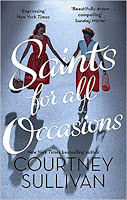
Autumn-Ali Smith
-I didn't have high hopes for this novel. To me, it had all the markings of an overhyped novel. But I loved every bit of it.
Saints for All Occasions-J. Courtney Sullivan
-This one is a close second for my favorite book of the year. This story of two sisters and the incredible bond they have that ultimately leads to their estrangement is one of those novels that I think I'll long remember. I cared about everyone in the book, faults and all.
The Valley at the Centre of the World-Malachy Tallack*
-As a writer, sometimes I read a book that makes me envious of the writer's talent. This is one of them. The story of a group of people all fighting against a changing--perhaps even disappearing--way of life is the kind of novel I love best in that it explores the lives of ordinary people in quiet, slow ways that ultimately illuminate what is so extraordinary about human beings, period. In my top three favorites for sure.
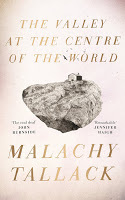
Anne Tyler-Clock Dance*
-Tyler makes it all look so effortless, every time. As always, she is a master of structure, and I especially loved the way she gives us four defining moments in a woman's life, with special emphasis on the last one.
Tin Man-Sarah Winman*
-This is a heartbreaker, but in all of the best ways.
The Serpent King-Jeff Zentner
-I can count on one hand the number of novels that have made me weep. This one did, and more than once. Zentner amazes me at his ability to get into the hearts and minds of teenagers, and into the complexities of small town life in a way that tells the complete truth, warts and dignity, and all.
Published on December 28, 2018 19:17
June 27, 2018
The Dragging Grains: Influences on Southernmost
Today I am doing the thirteenth stop on a book tour that is going to end up going to twenty different cities and two countries. Along the way I have often been asked about the influences on this book. Since most of you out there won't be at my readings on this tour I wanted to share some of the pieces of art that inspired and informed me during the eight or nine years that I was working on Southernmost.
One of the major themes of Southernmost is belief--finding it, losing it, desiring it. The main character, Asher Sharp, struggles with doubt and even losing his faith over the course of the book. I don't think it gives too much away, however, to tell you that he also has an epiphany in which he realizes that he loves not only everyone he knows, but even the strangers around him. This scene is directly inspired by an epiphany that was experienced by Thomas Merton at the corner of Fourth and Walnut in Louisville. The entire theology of the book is very influenced by Merton's ideas of God, belief, and worship. The Kentucky monk was famously ecumenical and his writings and teachings have had a tremendous impact on the world. You can read his own words about his epiphany at this link. Merton shows up in the book, too, when Asher receives a mysterious postcard that mentions him.
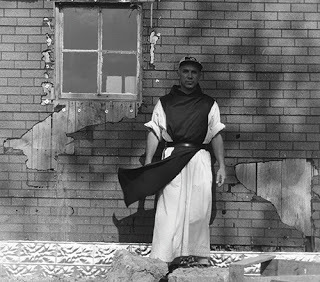
There is also a reference to Merton throughout the book in that he was someone who often talked and wrote about the idea of holiness existing in everything. He popularized the saying "Everything that is, is holy." Before him James Agee often riffed on this same way of thinking, particularly in his masterful nonfiction book, Let Us Now Praise Famous Men. But before either Agee or Merton, the brilliant poet and artist William Blake wrote "For everything that lives is holy. Life delights in life."
Asher is also led to the poetry of Elizabeth Bishop as he evolves. While writing the book, I read a lot of artists who had Key West connections, as Bishop did, but the poem that struck me the most was "Sandpiper". Its themes are so important to Southernmost and the poem could very well be the mantra of one of the characters in the book--Asher's brother, Luke. Also, the cover of Southernmost contains a reference to this poem in the form of the bird playing in the surf. Here's the poem:
The roaring alongside he takes for granted,and that every so often the world is bound to shake.he runs, he runs to the south, finical, awkward,in a state of controlled panic, a student of Blake.
The beach hisses like fat. On his left, a sheetof interrupting water comes and goesand glazes over his dark and brittle feet.He runs, he runs straight through it, watching his toes.
--Watching, rather, the spaces of sand between them,where (no detail too small) the Atlantic drainsrapidly backwards and downwards. As he runs,he stares at the dragging grains.
The world is a mist. And then the world isminute and vast and clear. The tideis higher or lower. He couldn't tell you which.His beak is focused; he is preoccupied,
looking for something, something, something.Poor bird, he is obsessed!The millions of grains are black, white, tan, and gray,mixed with quartz grains, rose and amethyst.
While working on the book I was particularly interested in stories about people of faith who were struggling with doubt or their own humanity. I somehow found Ingmar Bergman's amazingly beautiful 1962 film Winter Light , which explores the spiritual crisis of a priest who fears that God has become silent. The film not only helped me to work my way through presenting a character who was dealing with a similar existential crisis but also helped me to think about the tone of the book and how to keep theme consistent while also evolving. You can watch the film here:
While most people would count Their Eyes Were Watching God as their favorite novel by Zora Neale Hurston, mine by her is Jonah's Gourd Vine, her 1934 debut that is about a preacher who struggles to rectify his love for God and for preaching with his overwhelming sexual desires. It is also a book, like all of Hurston's work, rich in sense of place and sensuality found in everything: the weather, food, language, etc.
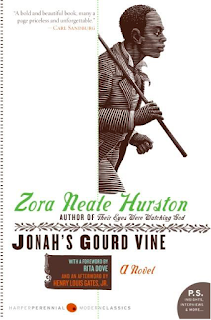
Another novel that had some influence on me during the writing of this novel was Abide With Me by Elizabeth Strout, mostly because her novel deals with a pastor who is struggling with his congregation. It's one of my favorite novels--definitely my favorite by her--although it is likely her least read book.
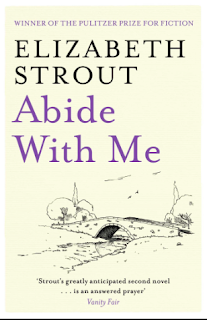
I should say here that when I'm working on a book, other books are probably the forms of art that have the least influence on me as I'm always trying to write something completely new and something completely my own. But sometimes there are books that display such perfect craft that they help me to figure out how to overcome some thematic obstacle. These two books did that for me with Southernmost.
As always for me, music plays a huge role in this novel. Music is probably the art form that has the biggest influence on my writing. I use it to develop my characters and to set the tone for my scenes. I almost always write with music playing. The main artists whom I was listening to on repeat were My Morning Jacket, Jim James, Joni Mitchell, Patty Griffin, Tom Petty, Daniel Martin Moore, and Joan Shelley. There are two soundtracks for the book available on Spotify. Follow them and occasionally I'll add other songs that had significant influence on the book.
When I'm working on a book, I seek out different kinds of art to help me along but also it feels to me as if the world is often presenting me with books, music, photographs, films, or other forms that speak to the novel at hand. I surround myself with as much art as I can when I'm working on a novel. I am usually spending years and years with a book so I need all the help I can get. Other forms of art supply it for me.
One of the major themes of Southernmost is belief--finding it, losing it, desiring it. The main character, Asher Sharp, struggles with doubt and even losing his faith over the course of the book. I don't think it gives too much away, however, to tell you that he also has an epiphany in which he realizes that he loves not only everyone he knows, but even the strangers around him. This scene is directly inspired by an epiphany that was experienced by Thomas Merton at the corner of Fourth and Walnut in Louisville. The entire theology of the book is very influenced by Merton's ideas of God, belief, and worship. The Kentucky monk was famously ecumenical and his writings and teachings have had a tremendous impact on the world. You can read his own words about his epiphany at this link. Merton shows up in the book, too, when Asher receives a mysterious postcard that mentions him.

There is also a reference to Merton throughout the book in that he was someone who often talked and wrote about the idea of holiness existing in everything. He popularized the saying "Everything that is, is holy." Before him James Agee often riffed on this same way of thinking, particularly in his masterful nonfiction book, Let Us Now Praise Famous Men. But before either Agee or Merton, the brilliant poet and artist William Blake wrote "For everything that lives is holy. Life delights in life."
Asher is also led to the poetry of Elizabeth Bishop as he evolves. While writing the book, I read a lot of artists who had Key West connections, as Bishop did, but the poem that struck me the most was "Sandpiper". Its themes are so important to Southernmost and the poem could very well be the mantra of one of the characters in the book--Asher's brother, Luke. Also, the cover of Southernmost contains a reference to this poem in the form of the bird playing in the surf. Here's the poem:
The roaring alongside he takes for granted,and that every so often the world is bound to shake.he runs, he runs to the south, finical, awkward,in a state of controlled panic, a student of Blake.
The beach hisses like fat. On his left, a sheetof interrupting water comes and goesand glazes over his dark and brittle feet.He runs, he runs straight through it, watching his toes.
--Watching, rather, the spaces of sand between them,where (no detail too small) the Atlantic drainsrapidly backwards and downwards. As he runs,he stares at the dragging grains.
The world is a mist. And then the world isminute and vast and clear. The tideis higher or lower. He couldn't tell you which.His beak is focused; he is preoccupied,
looking for something, something, something.Poor bird, he is obsessed!The millions of grains are black, white, tan, and gray,mixed with quartz grains, rose and amethyst.
While working on the book I was particularly interested in stories about people of faith who were struggling with doubt or their own humanity. I somehow found Ingmar Bergman's amazingly beautiful 1962 film Winter Light , which explores the spiritual crisis of a priest who fears that God has become silent. The film not only helped me to work my way through presenting a character who was dealing with a similar existential crisis but also helped me to think about the tone of the book and how to keep theme consistent while also evolving. You can watch the film here:
While most people would count Their Eyes Were Watching God as their favorite novel by Zora Neale Hurston, mine by her is Jonah's Gourd Vine, her 1934 debut that is about a preacher who struggles to rectify his love for God and for preaching with his overwhelming sexual desires. It is also a book, like all of Hurston's work, rich in sense of place and sensuality found in everything: the weather, food, language, etc.

Another novel that had some influence on me during the writing of this novel was Abide With Me by Elizabeth Strout, mostly because her novel deals with a pastor who is struggling with his congregation. It's one of my favorite novels--definitely my favorite by her--although it is likely her least read book.

I should say here that when I'm working on a book, other books are probably the forms of art that have the least influence on me as I'm always trying to write something completely new and something completely my own. But sometimes there are books that display such perfect craft that they help me to figure out how to overcome some thematic obstacle. These two books did that for me with Southernmost.
As always for me, music plays a huge role in this novel. Music is probably the art form that has the biggest influence on my writing. I use it to develop my characters and to set the tone for my scenes. I almost always write with music playing. The main artists whom I was listening to on repeat were My Morning Jacket, Jim James, Joni Mitchell, Patty Griffin, Tom Petty, Daniel Martin Moore, and Joan Shelley. There are two soundtracks for the book available on Spotify. Follow them and occasionally I'll add other songs that had significant influence on the book.
When I'm working on a book, I seek out different kinds of art to help me along but also it feels to me as if the world is often presenting me with books, music, photographs, films, or other forms that speak to the novel at hand. I surround myself with as much art as I can when I'm working on a novel. I am usually spending years and years with a book so I need all the help I can get. Other forms of art supply it for me.
Published on June 27, 2018 14:01
June 10, 2018
Book Tour-Knoxville
I'm in Knoxville for my third event on the book tour for my new novel, Southernmost. More about that in a bit. First, I want to tell you about looking out the window of my hotel and being washed over with a wave of nostalgia.
When I check into a hotel, one of the first things I do is examine the view. Today, I found the Church Street United Methodist Church standing right across from my room and I was drawn back to the summer of 1982, when I was ten years old. That was the summer the World's Fair came to Appalachia, and I spent months begging my parents to take me to Knoxville to see all of the exhibits and the amazing new Sunsphere that had been built there just for the fair. I do not have a lot of memories from my childhood. Snippets here and there. At the World's Fair I mostly remember the food, the traditional costumes that people from different countries were wearing, the cacophony of music and different languages as we wondered through.
But the thing I remember best is that my parents parked our car in front of this church. I remember it so clearly because it was the first time I ever remember being in a real city. I grew up about an hour north of Knoxville, just over the Kentucky state line, and we went there two or three times a year--usually if someone was in dire condition at one of the major hospitals in the city, or to shop for school clothes on Tax Free Day, which our state didn't have. But I never remember going downtown until that day. My parents were not the kind of people who travelled much. My father had been all over the world in the military and as a young married couple they had ventured off to "The North" to find work in the factories of Michigan before their homesickness was too much to bear and they returned home. So they weren't rubes. But they didn't much like leaving home. And they had no use for the city. Besides, back then there wasn't the kind of downtown revitalization that is occurring in cities now, so it's a wonder the World's Fair was located so near the heart of the city to begin with. But it had.
I remember this church because once the car was parked, I got out and looked up and it seemed to me that I was standing in front of a gigantic cathedral. I remember feeling as if it took forever to lean my head back enough to see all the way up to the top of the tower. I had never seen a church like this. I had never seen so much commerce and traffic all in one place. My parents were not comfortable in this situation and they had not wanted to bring me, but they always did everything they could to expand my horizons, to give me as much education and access as they could. So they had gone against everything in them and carried me to the city for a fair they had no desire to attend. Seeing the church reminded me of what great parents they had been and all the ways they gave me the keys to become a writer, which of course is the reason I'm here today.
Seeing the church made me thankful for my parents, for never questioning my desire to learn more and my artistic sensibility. It made me think about how geographically small my world was back then even though the world of my mind and heart were much larger, mostly because my parents made sure that was the case. Looking out at the church filled me a particular kind of longing that feels a lot like homesickness. Instead of pining for a place, however, it's about pining for a time, for days gone by that we never can have back again. For the youth of my parents and the promise that we must have all felt that day, even if only one of us was excited to be there.
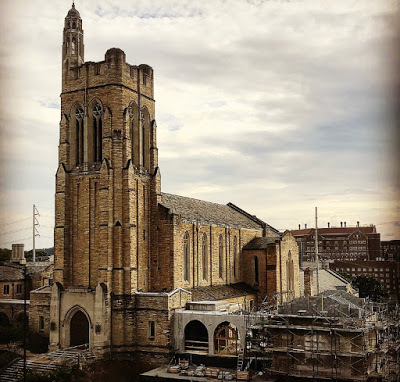 Taken from my hotel room, the Church Street United Methodist Church in afternoon light.
Taken from my hotel room, the Church Street United Methodist Church in afternoon light.
I'm always thankful to be a published writer. To have "made it" in the tough literary world enough to have my books out into the world. But looking out at the church where my young family had once parked their car made me even more thankful than usual. Because now I am here in the city to promote my book, and I'll be traveling all over the country to do that. And being a writer has now carried me all over the world and shown me things I never would have dreamt possible when I was that little boy standing on Henley Street with my mouth agape at the massive church before me.
This afternoon I walked the few blocks over to Union Avenue Books, once of the best bookstores in The South, where I was greeted with a huge crowd who were full of Sunday afternoon goodness. It was such a pleasure to visit with all of them and talk about the things that have always been important to me: books, language, community, family.
This is my third stop on book tour and so far it's been great, with really large crowds full of generous-hearted people in both Louisville and Lexington. I have a lot of stops ahead of me. I may be in my forties now, but I still miss my parents while I'm out on the road like this. And I certainly did today.
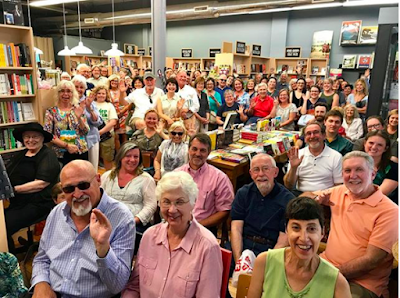 Most of the huge crowd that was awaiting me at Union Avenue Books this afternoon. It is always deeply moving to find that people have come out to see me.
Most of the huge crowd that was awaiting me at Union Avenue Books this afternoon. It is always deeply moving to find that people have come out to see me.
P.S. Since I failed to post them at the time, here are pictures from my first two events.
 My first event for Southernmost was held at Crescent Hill Church and was hosted by Carmichael's Bookstore in Louisville. We had more than 400 people.
My first event for Southernmost was held at Crescent Hill Church and was hosted by Carmichael's Bookstore in Louisville. We had more than 400 people.
 Almost 200 folks came out to my second event, at Brier Books in Lexington.
Almost 200 folks came out to my second event, at Brier Books in Lexington.
When I check into a hotel, one of the first things I do is examine the view. Today, I found the Church Street United Methodist Church standing right across from my room and I was drawn back to the summer of 1982, when I was ten years old. That was the summer the World's Fair came to Appalachia, and I spent months begging my parents to take me to Knoxville to see all of the exhibits and the amazing new Sunsphere that had been built there just for the fair. I do not have a lot of memories from my childhood. Snippets here and there. At the World's Fair I mostly remember the food, the traditional costumes that people from different countries were wearing, the cacophony of music and different languages as we wondered through.
But the thing I remember best is that my parents parked our car in front of this church. I remember it so clearly because it was the first time I ever remember being in a real city. I grew up about an hour north of Knoxville, just over the Kentucky state line, and we went there two or three times a year--usually if someone was in dire condition at one of the major hospitals in the city, or to shop for school clothes on Tax Free Day, which our state didn't have. But I never remember going downtown until that day. My parents were not the kind of people who travelled much. My father had been all over the world in the military and as a young married couple they had ventured off to "The North" to find work in the factories of Michigan before their homesickness was too much to bear and they returned home. So they weren't rubes. But they didn't much like leaving home. And they had no use for the city. Besides, back then there wasn't the kind of downtown revitalization that is occurring in cities now, so it's a wonder the World's Fair was located so near the heart of the city to begin with. But it had.
I remember this church because once the car was parked, I got out and looked up and it seemed to me that I was standing in front of a gigantic cathedral. I remember feeling as if it took forever to lean my head back enough to see all the way up to the top of the tower. I had never seen a church like this. I had never seen so much commerce and traffic all in one place. My parents were not comfortable in this situation and they had not wanted to bring me, but they always did everything they could to expand my horizons, to give me as much education and access as they could. So they had gone against everything in them and carried me to the city for a fair they had no desire to attend. Seeing the church reminded me of what great parents they had been and all the ways they gave me the keys to become a writer, which of course is the reason I'm here today.
Seeing the church made me thankful for my parents, for never questioning my desire to learn more and my artistic sensibility. It made me think about how geographically small my world was back then even though the world of my mind and heart were much larger, mostly because my parents made sure that was the case. Looking out at the church filled me a particular kind of longing that feels a lot like homesickness. Instead of pining for a place, however, it's about pining for a time, for days gone by that we never can have back again. For the youth of my parents and the promise that we must have all felt that day, even if only one of us was excited to be there.
 Taken from my hotel room, the Church Street United Methodist Church in afternoon light.
Taken from my hotel room, the Church Street United Methodist Church in afternoon light.I'm always thankful to be a published writer. To have "made it" in the tough literary world enough to have my books out into the world. But looking out at the church where my young family had once parked their car made me even more thankful than usual. Because now I am here in the city to promote my book, and I'll be traveling all over the country to do that. And being a writer has now carried me all over the world and shown me things I never would have dreamt possible when I was that little boy standing on Henley Street with my mouth agape at the massive church before me.
This afternoon I walked the few blocks over to Union Avenue Books, once of the best bookstores in The South, where I was greeted with a huge crowd who were full of Sunday afternoon goodness. It was such a pleasure to visit with all of them and talk about the things that have always been important to me: books, language, community, family.
This is my third stop on book tour and so far it's been great, with really large crowds full of generous-hearted people in both Louisville and Lexington. I have a lot of stops ahead of me. I may be in my forties now, but I still miss my parents while I'm out on the road like this. And I certainly did today.
 Most of the huge crowd that was awaiting me at Union Avenue Books this afternoon. It is always deeply moving to find that people have come out to see me.
Most of the huge crowd that was awaiting me at Union Avenue Books this afternoon. It is always deeply moving to find that people have come out to see me. P.S. Since I failed to post them at the time, here are pictures from my first two events.
 My first event for Southernmost was held at Crescent Hill Church and was hosted by Carmichael's Bookstore in Louisville. We had more than 400 people.
My first event for Southernmost was held at Crescent Hill Church and was hosted by Carmichael's Bookstore in Louisville. We had more than 400 people.
 Almost 200 folks came out to my second event, at Brier Books in Lexington.
Almost 200 folks came out to my second event, at Brier Books in Lexington.
Published on June 10, 2018 20:43
May 27, 2018
End of May (Music)
Here are a few recent releases I've been loving lately. And reasons why.
1. If I Don't See Ya-Brent Cobb. Reminds me of summers on the lake when I was in my early twenties, speeding down the lake with a cooler full of beers and half the folks dancing while the other half sang songs or shouted or laughed. And those are real good memories.
2. Leave It Alone-Amanda Shires. This is a whole new sound for her but it also makes perfect sense. I love it.
3. Just a Fool-Jim James. In my new book, Southernmost (out 6/5), one of the main characters secretly thinks the voice of God must sound like Jim James. I'm loving this new song of his.
4. Sky Full of Song-Florence and the Machine. Florence Welch's voice is just absolutely evocative and mournful and completely beautiful. Hearing her makes me feel big feelings.
5. 3 Mélodies, Op. 7-Sheku Kanneh-Mason, Gabriel Fauré, and various Orchestra Members. To me, the best part of the Royal Wedding was knowing about Sheku Kanne-Mason. So much emotion in his playing.
6. Lonely Weekend-Kacey Musgraves. I love everything on her new album, and this one has well-used bongos. I'm a sucker for well-used bongos.
7. My Heart is Dead-Theo Katzman. I love his Prince-like way of singing. And the whole arrangement.
8. To Rise You Gotta Fall-Nicki Bluhm is one of the most underrated singers out there. This new single is from her upcoming album.
9. Hard On A Heart-Ashley Monroe. This Glen Campbell influenced track is one of my favorites from Monroe's latest album, which I have on heavy rotation.
10. Same Boat-Albin Lee Meldau. Great vibe, especially for the summertime.
11. All That Fear-Lucy Rose is one of my favorite singers and I'll pretty much listen to whatever she sings. This is her latest.
12. Feel it Still-Portugal the Man. A perfect summer song with real substance.
13. Such a Simple Thing. Ray LaMontagne has one of the great modern male voices and his records always make me feel good.
14. Kate McCannon-Colter Wall. This Canadian folk-singer isn't to everyone's taste and his (great) drone of a singing voice is a lot to take for an entire album for one song at a time it's pretty great, and Very well written murder ballad.
15. Fallingwater-Maggie Rogers. Another great summer sound.
16. The Duffler-Fantastic Negrito is making really interesting music and this has a great vibe to it.
1. If I Don't See Ya-Brent Cobb. Reminds me of summers on the lake when I was in my early twenties, speeding down the lake with a cooler full of beers and half the folks dancing while the other half sang songs or shouted or laughed. And those are real good memories.
2. Leave It Alone-Amanda Shires. This is a whole new sound for her but it also makes perfect sense. I love it.
3. Just a Fool-Jim James. In my new book, Southernmost (out 6/5), one of the main characters secretly thinks the voice of God must sound like Jim James. I'm loving this new song of his.
4. Sky Full of Song-Florence and the Machine. Florence Welch's voice is just absolutely evocative and mournful and completely beautiful. Hearing her makes me feel big feelings.
5. 3 Mélodies, Op. 7-Sheku Kanneh-Mason, Gabriel Fauré, and various Orchestra Members. To me, the best part of the Royal Wedding was knowing about Sheku Kanne-Mason. So much emotion in his playing.
6. Lonely Weekend-Kacey Musgraves. I love everything on her new album, and this one has well-used bongos. I'm a sucker for well-used bongos.
7. My Heart is Dead-Theo Katzman. I love his Prince-like way of singing. And the whole arrangement.
8. To Rise You Gotta Fall-Nicki Bluhm is one of the most underrated singers out there. This new single is from her upcoming album.
9. Hard On A Heart-Ashley Monroe. This Glen Campbell influenced track is one of my favorites from Monroe's latest album, which I have on heavy rotation.
10. Same Boat-Albin Lee Meldau. Great vibe, especially for the summertime.
11. All That Fear-Lucy Rose is one of my favorite singers and I'll pretty much listen to whatever she sings. This is her latest.
12. Feel it Still-Portugal the Man. A perfect summer song with real substance.
13. Such a Simple Thing. Ray LaMontagne has one of the great modern male voices and his records always make me feel good.
14. Kate McCannon-Colter Wall. This Canadian folk-singer isn't to everyone's taste and his (great) drone of a singing voice is a lot to take for an entire album for one song at a time it's pretty great, and Very well written murder ballad.
15. Fallingwater-Maggie Rogers. Another great summer sound.
16. The Duffler-Fantastic Negrito is making really interesting music and this has a great vibe to it.
Published on May 27, 2018 13:47
May 14, 2018
Favorite Books (Today)
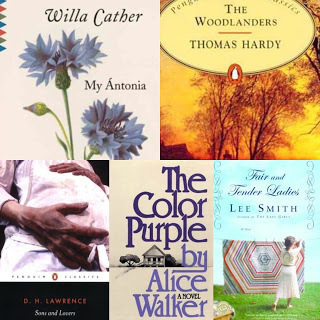
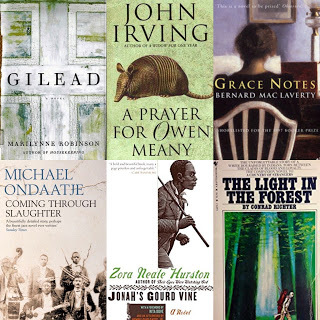
A friend recently challenged me to post my ten favorite books on Facebook, one a day, for the next ten days. I've decided to post them all in one fell swoop here so I can try to articulate my thinking a bit. Choosing ten favorite books is just about impossible for me. It's akin to choosing a favorite child. So instead, I tried to think about the ten books that are really speaking to me today as ones that changed me as a person and a writer. My list of favorites is constantly changing. So, this is my list of ten favorites today. It might be different tomorrow.
As you'll see if you keep reading, sometimes I've chosen one book by a favorite author simply as a placeholder for many books.
I'm listing these in no real particular order but my two favorite writers are Willa Cather and Thomas Hardy, so I'll talk about them first.
I absolutely love Cather's My Antonia , O Pioneers!, My Mortal Enemy, and Death Comes For the Archbishop. They are all simultaneously very different and singular while all being singularly Catheresque. But when I think about the one that was most transformative for me, I have to choose My Antonia. To me, it is a book about pining--one of my favorite themes--and it is in particular a book about that perhaps most common pining: homesickness, which is something I know well. I also think that it is probably the most autobiographical of Cather's books. I believe she is revealing herself in a way she never did before or again. Having read everything I can about Cather, no other character she ever wrote is more like her than Jim Burden, the narrator who tells us of the way he has pined for Antonia--and ultimately, Nebraska, and the West, and America--his whole life. It's a nostalgic book, but never sentimental. It's an elegy, but it's never maudlin. To me, it is one of the essential novels of the American experience, and I think it's meditations on immigration make it more relevant than ever before. Most of all, I love those characters, especially strong, determined, obstacle-laden Antonia, whom I always picture standing in a field with her fists on her hips, the red sun behind her.
One of the best days of my entire life was when I got to spend hours roaming the bluebell-decorated woods where Thomas Hardy grew up in Dorset, England. We got to see his birthplace, the church he attended as a child, and the elegant estate he lived in as an older man. We got to see handwritten manuscripts and his mother dress and his very own writing desk. But nothing moved me as much as those woods. I'll think about them for the rest of my life. The way the breeze stirred through them not much stronger than a breath, the wild ponies running free there, the still pond, the glow of beech leaves above me when there was sunshine, and the mist on my face when there was rain. I could go on and on. So, when I was forced to pick just one of Hardy's books for this list, I chose The Woodlanders , mostly because they conjure up those woods so perfectly. But also because at its heart is a story of longing that is hard to equal in literature. It's the major novel of his that doesn't get talked about nearly enough. The others of his that I adore are Jude the Obscure and Tess of the D'Urbervilles, and either of them could have easily filled this slot, too. Lots of people tell me they can't read Hardy because he's too dark. That's why I love him. He was so ahead of his time, especially in the way he looked at marriage and religion, often with ideas that wouldn't become mainstream until after World War II, although he died in 1928. No other writer can conjure place like him, and no other writer has had so great an influence on me.
Sons and Lovers by D.H. Lawrence is an epic that I think about all the time. It's such a complex look at the way parental love shapes our entire lives. But it's also about the joys and sorrows of being an artist. The way he captures the coal mining region of England is unparalleled. The way he writes about trees and meadows and the people who populate his novel--all of it is pretty perfect. It is also sensual in every way a book can be: not only sexual relationships, but also the weather, the food, the art, the music. Sons and Lovers is a big, dense book, and I am a slow, lumbering reader. But I devoured it nonetheless. It is by far my favorite of his. Lawrence is actually hit or miss for me. But the other book of his that is among my favorites is a perfect novella called The Fox .
Probably no other book had such an impact on me as The Color Purple by Alice Walker. I was raised in a strict fundamentalist home and community and our idea of God was very small. Reading this novel made my idea of God very large. It completely changed who I was not only spiritually but in just about every way. I saw the world in a different light, especially issues of race and gender. Once, when I was teaching a Southern Lit class at a university I won't name, I assigned all of the students to read this novel, mostly because I think everyone should read it. One of the students complained, saying that it was pornographic and unbelievable. Her disbelief was tied up in the fact that she believed "no woman has ever had it this hard." I told her that that kind of thinking was exactly why we should be reading it. That student never got on board during that semester but I hope that one day she returned to it and gave it another chance. The reason she was so opposed to it was because that it challenged everything she believed in. That's why I loved it. I also love it because I think of those characters as real people. I will never forget them, especially Celie.
When I was in ninth grade, I somehow stumbled upon a copy of Black Mountain Breakdown by Lee Smith, who was raised not far from me, just over the Virginia state line, in Grundy. For the first time ever I encountered characters in a book who were like me and my family. They ate what we ate (pinto beans, sauerkraut, fried cabbage, fried potatoes, etc.), talked the way we did, went to towns where I had actually been, listened to the songs that people sang in my church and on my porch. For the first in my life, I saw myself in a book. And few things are more life-changing. After that, I read everything I could by Lee Smith, but no other book of hers is as masterful, devastating, and remarkable as Fair and Tender Ladies . It not only gives you the entire history of Appalachia over the course of the twentieth century through one woman's point of view, it also draws you fully into that woman's life. Ivy Rowe is one of the great creations of American literature and the only reason she isn't celebrated as such is because most of those who hold the reins of American literature cannot handle such a complex Appalachian woman. My other favorite books by Lee Smith are Saving Grace and Live Bottomless (included in the collection News of the Spirit) the latter a novella that had a huge influence on my newest book, Southernmost .
There's a line in Gilead I will never forget: "For me, writing has always felt like praying...you feel you are with someone." That line sums up what I love about Gilead. It was a spiritual awakening for me in much the same way The Color Purple was. I think that Gilead is a sort of praise song to everything and everybody. Lots of people have trouble getting through it. It is slow and introspective. That's why I love it. This is one of the harder ones for me to pick because I love every novel that Robinson has ever written. Housekeeping, Lila, and Home, are all favorites of mine, and I think they are all three more accessible. But I am choosing Gilead because it's the first one of hers to really light a fire under me, and because I think it's the most brilliant of hers.
John Irving is another writer who is hit-or-miss for me. Some of his books I just cannot get through. Others, I couldn't put down. No other book of his hit me so hard as A Prayer for Owen Meany . I will never, ever forget it and its amazing cast of characters. As the child of a Vietnam veteran, the book helped me to understand that war better than anything else has. Perhaps that's one reason I love it so much, but even more I think it's the first book that completely reached its arms out, drew me in, and swallowed me whole. When I was reading A Prayer for Owen Meany, the world around me completely shut down and I was transported into the heart of the book. Irving created a world and characters so real that I could hardly snap out of reading it to get back to real life. That's a real accomplishment and few books have done it as well. Whenever I see the cover, I am filled up with a good kind of sadness for the characters that live within.
A few years ago I was about to go to Ireland for the first time, to teach for three weeks in a class that would take me all over the island. I did lots of research on what I should read to prepare. Someone told me that I had to read Bernard MacLaverty, and I can't thank them enough for that because he is now one of my all-time favorite writers. I have loved every single book of his, including his most recent, Midwinter Break, which came out just last year. If you want to understand the Troubles, there is no better source than his very short novel Cal. His novel Lamb had a tremendous influence on my forthcoming book, Southernmost . But Grace Notes is the one I have to choose as my favorite of his because it articulates so many of the emotions I have as a person and so many of the emotions that I know to be hard to articulate as a novelist. Yet he does it so well. MacLaverty is interested in the specifics of everyday life, the big drama of normal lives. That's what I care about as a writer and a reader, too. I can't think of another book that has so expertly been able to capture the power of music, the complexities of the parent-child relationship, and, most of all, what it means to be an artist. MacLaverty is from Ireland but has lived in Scotland for the past thirty years or so...this book perfectly bridges those two cultures and that's another reason I love it.
I love Michael Ondaatje's Coming Through Slaughter because of the way it plays with form, mixing disciplines (poetry, fiction, nonfiction), conjuring music on the page, and creative cinematic images I can not get out of my head. An absolute masterpiece that I will never get over.
Everyone loves Their Eyes Were Watching God, and so do I, but my favorite book by Zora Neale Hurston (one of the five or six authors I worship) is Jonah's Gourd Vine . It's another one that had a huge impact on my new novel because it looks at the way a man can be torn between God and his own mind--or in Jonah's case, his own body. I love the way it examines the way that religion and being human are so often at odds with one another. And I love the way Hurston takes me completely into that world. I love everything about this novel and it seems like one that not that many people know about, so I especially like passing it onto others.
The last book I'm listing today is Conrad Richter's The Light in the Forest . It's the only book on the list that could be classified as young adult. It wasn't marketed that way at the time of its publication in 1953. The plot might seem cliched now just because it's been ripped off so much since it first arrived: a white boy in Revolutionary War times is kidnapped by Indians, assimilates, and when he is taken back to his white family, cannot assimilate with them. What I love most about it is that it, too, was ahead of its time in the way it thought about the erasure of Native Americans, but most of all the reason it's one of my favorite books is because of the way Richter writes about the forest, and specifically "the light in the forest", which I think about every single time I'm in the woods. I won't give away what that phrase means, but it is pretty profound, and it's the reason I tell so many people to read this book. I also love Richter's The Trees, the first of a trilogy of books about the settling of America (the other two titles are The Fields and The Town).
Now that I've written the above, I'm thinking of so many other current favorites of mine, a few of which I will list below. In choosing these ten my top ten has already shifted and changed, as it is constantly doing, just as I said at the outset. Any of the books listed below could have also easily been on my top ten list. I hope some of these are books you love, too, or that you will read. Let me know any thoughts or concerns. Happy Reading.
Other favorites (today, no particular order):
Life After Life and A God in Ruins-Kate Atkinson
Days Without End-Sebastian Barry
The Lacuna and The Bean Trees-Barbara Kingsolver
The Dollmaker-Harriette Arnow
River of Earth-James Still
Jayber Crow-Wendell Berry
The Outsiders-SE Hinton
Alias Grace-Margaret Atwood
Bastard Out of Carolina-Dorothy Allison
The Grass Dancer-Susan Power
The Last Report on the Miracles at Little No Horse-Louise Erdrich
Father and Son-Larry Brown
The Power and the Glory-Graham Greene
Exiles-Ron Hansen
Storming Heaven and The Unquiet Earth-Denise Giardina
True Grit-Charles Portis
Benediction-Kent Haruf
The Evening Chorus and Coventry-Helen Humphreys
Brooklyn-Colm Toibin
Feather Crowns-Bobbie Ann Mason
Beloved-Toni Morrison
The Essex Serpent-Sarah Perry
Angle of Repose-Wallace Stegner
Mothering Sunday-Graham Swift
Abide With Me-Elizabeth Strout
A Spool of Blue Thread-Anne Tyler
Transatlantic and Let the Great World Spin-Colum McCann
News of the World-Paulette Jiles
Published on May 14, 2018 09:13
April 30, 2018
June Tour Dates
My June tour dates. The rest of summer will be announced later. Come see me please, or I’ll be lonesome. My June tour dates. The rest of summer will be announced later. Come see me please, or I’ll be lonesome. (Missing from this: I’ll be in Abingdon, Virginia on June 30).


Published on April 30, 2018 06:45
March 4, 2018
You Hate Poor People (And Other Things I Want to Tell the Academy)
[Forgive the spacing issues throughout: Blogger is not cooperating right now]
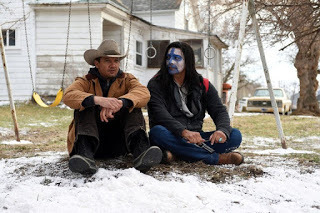 Since the Oscars happen tonight...This could make for a divisive conversation, but just remember that this is only my opinion as a normal moviegoer. I'll try to keep my focus on the Best Picture race.
Since the Oscars happen tonight...This could make for a divisive conversation, but just remember that this is only my opinion as a normal moviegoer. I'll try to keep my focus on the Best Picture race.
I think that Oscars shouldn't be for favorites but for great productions, great filmmaking, a great combination (especially the technical aspects) of all the best things that make movies great: technical aspects, performances, writing, direction, set design, everything. Basically, Best Picture is for a film on which just about everything is working together perfectly.
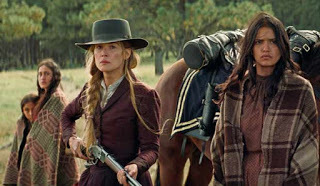 Five of my favorite movies of the year weren't nominated for Best Picture, and I think they should've been. The first two of these are Hostiles and Wind River and what's most interesting to me about these omissions is that they make such nuanced statements about the way Native people have been treated in this country. In a time when Hollywood and the Twittersphere like to claim that they're "woke" they still don't give a damn about Native Americans. I really loved both of these films for not only that theme but also for the performances, writing, and technical aspects...I thought they were truly great films. (An aside, though: it is troubling that while these movies do a great job of examining Native issues they were not Native-made and the Native characters are secondary characters...they would have been even better movies if that had been different)
Five of my favorite movies of the year weren't nominated for Best Picture, and I think they should've been. The first two of these are Hostiles and Wind River and what's most interesting to me about these omissions is that they make such nuanced statements about the way Native people have been treated in this country. In a time when Hollywood and the Twittersphere like to claim that they're "woke" they still don't give a damn about Native Americans. I really loved both of these films for not only that theme but also for the performances, writing, and technical aspects...I thought they were truly great films. (An aside, though: it is troubling that while these movies do a great job of examining Native issues they were not Native-made and the Native characters are secondary characters...they would have been even better movies if that had been different)
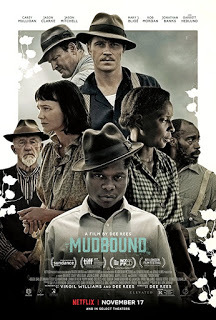
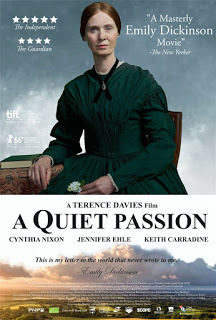 The other three that weren't nominated are The Florida Project, Mudbound, and A Quiet Passion. I won't say much about A Quiet Passion except that it's profound and, as the title suggests, very quiet, like all of Terrence Davies' films. It's a movie about a writer for writers, and it's also a unique look at a woman who refuses to do what society tells her. Mudbound is a hugely overlooked beauty, too, and while it largely deals with racism, it's also about poor people and again exhibits the way the Academy can't seem to get on board with shining too bright a light on a complex look at that (although their showering of nominations on Three Billboards shows they like a simplistic view of it).
The other three that weren't nominated are The Florida Project, Mudbound, and A Quiet Passion. I won't say much about A Quiet Passion except that it's profound and, as the title suggests, very quiet, like all of Terrence Davies' films. It's a movie about a writer for writers, and it's also a unique look at a woman who refuses to do what society tells her. Mudbound is a hugely overlooked beauty, too, and while it largely deals with racism, it's also about poor people and again exhibits the way the Academy can't seem to get on board with shining too bright a light on a complex look at that (although their showering of nominations on Three Billboards shows they like a simplistic view of it).
Mudbound is the kind of film that should have been prime Oscar bait: it's epic in scope, zooming in on one of the defining themes of American life; it has a slew of great performances; the writing is lovely and succinct; and the cinematography captures everything from wide summer fields to the moonlit striped darkness of a barn. But it didn't receive a nomination for Best Picture either.
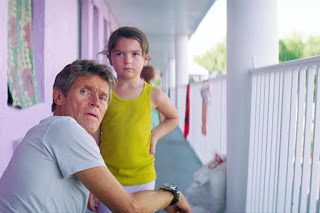 The Florida Project is the film that has haunted me the most from this year...I've thought about it just about every day since I saw it. That really says something for a movie. The performances are amazing. If Willem Dafoe doesn't win (the only nomination for the film, I think) then I will be really disappointed, and I've never been a Dafoe fan before this. But his performance is so human, so layered, so full of moments where he acts only with his physicality (since he never gets a big dramatic monologue like Oscar nominees tend to do); the writing is top-notch, lyrical while being gritty and real, full of emotion without ever once slipping into sentimentality. I've never seen a film that better captures how a place really sounds--traffic, helicopters, children playing, people chatting on their porches. And it's a master class in sense of place. Perhaps best of all The Florida Project gets right what movies hardly ever do: poverty, class issues, poor people (WIND RIVER is also about these issues and again, the Academy totally ignored it...seems like they have a real problem rewarding films that feature poor folks). The characters are portrayed with dignity and complexity and surprising layers. But this country still doesn't know how to have a conversation about class and when it is presented honestly a lot of viewers don't know how to process that.
The Florida Project is the film that has haunted me the most from this year...I've thought about it just about every day since I saw it. That really says something for a movie. The performances are amazing. If Willem Dafoe doesn't win (the only nomination for the film, I think) then I will be really disappointed, and I've never been a Dafoe fan before this. But his performance is so human, so layered, so full of moments where he acts only with his physicality (since he never gets a big dramatic monologue like Oscar nominees tend to do); the writing is top-notch, lyrical while being gritty and real, full of emotion without ever once slipping into sentimentality. I've never seen a film that better captures how a place really sounds--traffic, helicopters, children playing, people chatting on their porches. And it's a master class in sense of place. Perhaps best of all The Florida Project gets right what movies hardly ever do: poverty, class issues, poor people (WIND RIVER is also about these issues and again, the Academy totally ignored it...seems like they have a real problem rewarding films that feature poor folks). The characters are portrayed with dignity and complexity and surprising layers. But this country still doesn't know how to have a conversation about class and when it is presented honestly a lot of viewers don't know how to process that.
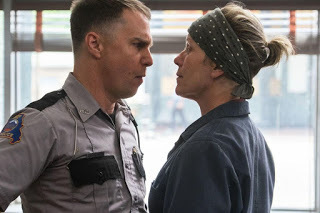 Which leads me to why I'm so disappointed by the hugely positive reaction Three Billboards has gotten...because it gets rural life and class so very wrong. It gets just about everything wrong, I think, but perhaps most troublingly the way it examines domestic abuse with such a limited lens, the way it uses homophobic and racist talk to be "edgy" instead of to actually SAY something, the way it insists on celebrating a racist, homophobic, misogynistic character, not to mention the intelligence-insulting gaping plot holes (why does the guy even go into the gift shop if he's not the killer? why does the new police chief suspend Rockwell's character for talking back but never mention him throwing a man out of a window, which he witnessed...I could go on and on here). It's as if the creator had a checklist of things that happen in rural places: domestic violence, check; everybody knows everybody, check; everyone is racist, check; everyone is homophobic, check; the women are either strong and asexual or over-sexualized, check...I could go on). It's worth seeing for McDormand's performance but even that is ruined because her character is so inconsistent. Three Billboards is the Hillbilly Elegy of cinema in that it's a film about rural America in that the filmmaker thinks he's an expert when he doesn't really know much at all. McDonagh is a Brit who likes to talk about being Irish when that's convenient in much the same way Vance is an Appalachian "expert" despite not being raised there. And now McDonagh has gone from mythologizing Ireland to doing the same with rural America. No other film in a long time has frustrated and troubled me as much as this one...but what troubles me most is how widely embraced it has been. I wanted so badly to love it because I always love seeing rural people on the big screen. But not when they're portrayed so incorrectly.
Which leads me to why I'm so disappointed by the hugely positive reaction Three Billboards has gotten...because it gets rural life and class so very wrong. It gets just about everything wrong, I think, but perhaps most troublingly the way it examines domestic abuse with such a limited lens, the way it uses homophobic and racist talk to be "edgy" instead of to actually SAY something, the way it insists on celebrating a racist, homophobic, misogynistic character, not to mention the intelligence-insulting gaping plot holes (why does the guy even go into the gift shop if he's not the killer? why does the new police chief suspend Rockwell's character for talking back but never mention him throwing a man out of a window, which he witnessed...I could go on and on here). It's as if the creator had a checklist of things that happen in rural places: domestic violence, check; everybody knows everybody, check; everyone is racist, check; everyone is homophobic, check; the women are either strong and asexual or over-sexualized, check...I could go on). It's worth seeing for McDormand's performance but even that is ruined because her character is so inconsistent. Three Billboards is the Hillbilly Elegy of cinema in that it's a film about rural America in that the filmmaker thinks he's an expert when he doesn't really know much at all. McDonagh is a Brit who likes to talk about being Irish when that's convenient in much the same way Vance is an Appalachian "expert" despite not being raised there. And now McDonagh has gone from mythologizing Ireland to doing the same with rural America. No other film in a long time has frustrated and troubled me as much as this one...but what troubles me most is how widely embraced it has been. I wanted so badly to love it because I always love seeing rural people on the big screen. But not when they're portrayed so incorrectly.
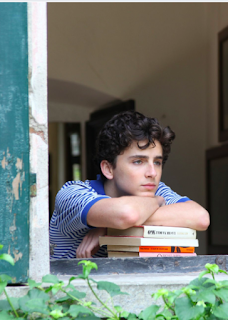 Call Me By Your Name is a sensory feast--not only the romance but also the food, the weather, the scenery, the books, everything about it. If it doesn't win Best Screenplay I will die. Also, Armie Hammer was completely robbed by not being nominated and Michael Stuhlburg, also not even nominated, should have WON just for that incredible speech he gives to his son at the end. It's hard to talk about this movie without giving away the plot but what I loved most about it is that we go in thinking it's mostly going to be a romantic love story but it turns out to be a love story about place and family more than anything else. It's a really beautiful production that stays with you for a long while.
Call Me By Your Name is a sensory feast--not only the romance but also the food, the weather, the scenery, the books, everything about it. If it doesn't win Best Screenplay I will die. Also, Armie Hammer was completely robbed by not being nominated and Michael Stuhlburg, also not even nominated, should have WON just for that incredible speech he gives to his son at the end. It's hard to talk about this movie without giving away the plot but what I loved most about it is that we go in thinking it's mostly going to be a romantic love story but it turns out to be a love story about place and family more than anything else. It's a really beautiful production that stays with you for a long while.
Dunkirk-A truly great production. Innovative, interesting, engaging, moving, technically adventurous (hardly any CGI, for example). This movie deserves it more than any other I've seen this year as a great feat of filmmaking. I say that based totally on how great a production it is.
The Post-Solid and safe and very good filmmaking and totally not deserving of a Best Picture nomination. I really enjoyed everything about it but there is nothing innovative going on. Great script that I think deserves an Oscar. I thought the ensemble cast was terrific.
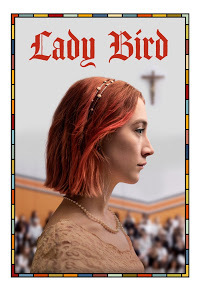 Lady Bird-Very enjoyable to watch but no cinematic feats happening here except for the performances of Metcalfe and Ronan. I think it's overhyped but it's still a really good movie with a very moving coda. It's a great film for looking at sense of place. I really wanted Laurie Metcalfe to win Best Supporting Actress because she makes this movie, for me, but I also think Alison Janney deserves it for her amazing performance in I, Tanya. I do have to give the Academy props here for considering a film like Lady Bird that does look at being lower middle class, but even though that's discussed a lot hey're not poor....struggling, maybe, but really the teenaged girl just feels poor in the film.
Lady Bird-Very enjoyable to watch but no cinematic feats happening here except for the performances of Metcalfe and Ronan. I think it's overhyped but it's still a really good movie with a very moving coda. It's a great film for looking at sense of place. I really wanted Laurie Metcalfe to win Best Supporting Actress because she makes this movie, for me, but I also think Alison Janney deserves it for her amazing performance in I, Tanya. I do have to give the Academy props here for considering a film like Lady Bird that does look at being lower middle class, but even though that's discussed a lot hey're not poor....struggling, maybe, but really the teenaged girl just feels poor in the film.
Darkest Hour-Solid, safe, with one incredibly beautiful and moving scene. Oldman's performance is great but almost too over-the-top for me--you can practically feel the spittle flying out of his mouth onto your face, and I'm not sure that's a good thing. I got bored in this film, and I don't get bored easily. I really love a slow pace. But I found it repetitive (in this scene he's screaming at Parliament, in this scene he's in the bath tub smoking cigars, now he's yelling at Parliament, now another bath). Ultimately, I found the whole thing a bit forgettable (except for that one scene on the Tube). Get Out-This film provides great cultural conversation but in my opinion it is not a great piece of cinema by any means and the only thing Oscar worthy about it to me was the performance of Daniel Kaluuya.
I haven't seen The Shape of Water or Phantom Thread.
In the end, awards really only matter to the people winning them and the best thing about the Oscars is the show really does celebrate one of our greatest art forms. I love movies. They are one of the reasons I became a writer and they're one of the things that sustain me as a writer. In the end, I don't need the Oscars to tell me what the best ones were and will just sit back and enjoy the show.
 Since the Oscars happen tonight...This could make for a divisive conversation, but just remember that this is only my opinion as a normal moviegoer. I'll try to keep my focus on the Best Picture race.
Since the Oscars happen tonight...This could make for a divisive conversation, but just remember that this is only my opinion as a normal moviegoer. I'll try to keep my focus on the Best Picture race. I think that Oscars shouldn't be for favorites but for great productions, great filmmaking, a great combination (especially the technical aspects) of all the best things that make movies great: technical aspects, performances, writing, direction, set design, everything. Basically, Best Picture is for a film on which just about everything is working together perfectly.
 Five of my favorite movies of the year weren't nominated for Best Picture, and I think they should've been. The first two of these are Hostiles and Wind River and what's most interesting to me about these omissions is that they make such nuanced statements about the way Native people have been treated in this country. In a time when Hollywood and the Twittersphere like to claim that they're "woke" they still don't give a damn about Native Americans. I really loved both of these films for not only that theme but also for the performances, writing, and technical aspects...I thought they were truly great films. (An aside, though: it is troubling that while these movies do a great job of examining Native issues they were not Native-made and the Native characters are secondary characters...they would have been even better movies if that had been different)
Five of my favorite movies of the year weren't nominated for Best Picture, and I think they should've been. The first two of these are Hostiles and Wind River and what's most interesting to me about these omissions is that they make such nuanced statements about the way Native people have been treated in this country. In a time when Hollywood and the Twittersphere like to claim that they're "woke" they still don't give a damn about Native Americans. I really loved both of these films for not only that theme but also for the performances, writing, and technical aspects...I thought they were truly great films. (An aside, though: it is troubling that while these movies do a great job of examining Native issues they were not Native-made and the Native characters are secondary characters...they would have been even better movies if that had been different)
 The other three that weren't nominated are The Florida Project, Mudbound, and A Quiet Passion. I won't say much about A Quiet Passion except that it's profound and, as the title suggests, very quiet, like all of Terrence Davies' films. It's a movie about a writer for writers, and it's also a unique look at a woman who refuses to do what society tells her. Mudbound is a hugely overlooked beauty, too, and while it largely deals with racism, it's also about poor people and again exhibits the way the Academy can't seem to get on board with shining too bright a light on a complex look at that (although their showering of nominations on Three Billboards shows they like a simplistic view of it).
The other three that weren't nominated are The Florida Project, Mudbound, and A Quiet Passion. I won't say much about A Quiet Passion except that it's profound and, as the title suggests, very quiet, like all of Terrence Davies' films. It's a movie about a writer for writers, and it's also a unique look at a woman who refuses to do what society tells her. Mudbound is a hugely overlooked beauty, too, and while it largely deals with racism, it's also about poor people and again exhibits the way the Academy can't seem to get on board with shining too bright a light on a complex look at that (although their showering of nominations on Three Billboards shows they like a simplistic view of it). Mudbound is the kind of film that should have been prime Oscar bait: it's epic in scope, zooming in on one of the defining themes of American life; it has a slew of great performances; the writing is lovely and succinct; and the cinematography captures everything from wide summer fields to the moonlit striped darkness of a barn. But it didn't receive a nomination for Best Picture either.
 The Florida Project is the film that has haunted me the most from this year...I've thought about it just about every day since I saw it. That really says something for a movie. The performances are amazing. If Willem Dafoe doesn't win (the only nomination for the film, I think) then I will be really disappointed, and I've never been a Dafoe fan before this. But his performance is so human, so layered, so full of moments where he acts only with his physicality (since he never gets a big dramatic monologue like Oscar nominees tend to do); the writing is top-notch, lyrical while being gritty and real, full of emotion without ever once slipping into sentimentality. I've never seen a film that better captures how a place really sounds--traffic, helicopters, children playing, people chatting on their porches. And it's a master class in sense of place. Perhaps best of all The Florida Project gets right what movies hardly ever do: poverty, class issues, poor people (WIND RIVER is also about these issues and again, the Academy totally ignored it...seems like they have a real problem rewarding films that feature poor folks). The characters are portrayed with dignity and complexity and surprising layers. But this country still doesn't know how to have a conversation about class and when it is presented honestly a lot of viewers don't know how to process that.
The Florida Project is the film that has haunted me the most from this year...I've thought about it just about every day since I saw it. That really says something for a movie. The performances are amazing. If Willem Dafoe doesn't win (the only nomination for the film, I think) then I will be really disappointed, and I've never been a Dafoe fan before this. But his performance is so human, so layered, so full of moments where he acts only with his physicality (since he never gets a big dramatic monologue like Oscar nominees tend to do); the writing is top-notch, lyrical while being gritty and real, full of emotion without ever once slipping into sentimentality. I've never seen a film that better captures how a place really sounds--traffic, helicopters, children playing, people chatting on their porches. And it's a master class in sense of place. Perhaps best of all The Florida Project gets right what movies hardly ever do: poverty, class issues, poor people (WIND RIVER is also about these issues and again, the Academy totally ignored it...seems like they have a real problem rewarding films that feature poor folks). The characters are portrayed with dignity and complexity and surprising layers. But this country still doesn't know how to have a conversation about class and when it is presented honestly a lot of viewers don't know how to process that.  Which leads me to why I'm so disappointed by the hugely positive reaction Three Billboards has gotten...because it gets rural life and class so very wrong. It gets just about everything wrong, I think, but perhaps most troublingly the way it examines domestic abuse with such a limited lens, the way it uses homophobic and racist talk to be "edgy" instead of to actually SAY something, the way it insists on celebrating a racist, homophobic, misogynistic character, not to mention the intelligence-insulting gaping plot holes (why does the guy even go into the gift shop if he's not the killer? why does the new police chief suspend Rockwell's character for talking back but never mention him throwing a man out of a window, which he witnessed...I could go on and on here). It's as if the creator had a checklist of things that happen in rural places: domestic violence, check; everybody knows everybody, check; everyone is racist, check; everyone is homophobic, check; the women are either strong and asexual or over-sexualized, check...I could go on). It's worth seeing for McDormand's performance but even that is ruined because her character is so inconsistent. Three Billboards is the Hillbilly Elegy of cinema in that it's a film about rural America in that the filmmaker thinks he's an expert when he doesn't really know much at all. McDonagh is a Brit who likes to talk about being Irish when that's convenient in much the same way Vance is an Appalachian "expert" despite not being raised there. And now McDonagh has gone from mythologizing Ireland to doing the same with rural America. No other film in a long time has frustrated and troubled me as much as this one...but what troubles me most is how widely embraced it has been. I wanted so badly to love it because I always love seeing rural people on the big screen. But not when they're portrayed so incorrectly.
Which leads me to why I'm so disappointed by the hugely positive reaction Three Billboards has gotten...because it gets rural life and class so very wrong. It gets just about everything wrong, I think, but perhaps most troublingly the way it examines domestic abuse with such a limited lens, the way it uses homophobic and racist talk to be "edgy" instead of to actually SAY something, the way it insists on celebrating a racist, homophobic, misogynistic character, not to mention the intelligence-insulting gaping plot holes (why does the guy even go into the gift shop if he's not the killer? why does the new police chief suspend Rockwell's character for talking back but never mention him throwing a man out of a window, which he witnessed...I could go on and on here). It's as if the creator had a checklist of things that happen in rural places: domestic violence, check; everybody knows everybody, check; everyone is racist, check; everyone is homophobic, check; the women are either strong and asexual or over-sexualized, check...I could go on). It's worth seeing for McDormand's performance but even that is ruined because her character is so inconsistent. Three Billboards is the Hillbilly Elegy of cinema in that it's a film about rural America in that the filmmaker thinks he's an expert when he doesn't really know much at all. McDonagh is a Brit who likes to talk about being Irish when that's convenient in much the same way Vance is an Appalachian "expert" despite not being raised there. And now McDonagh has gone from mythologizing Ireland to doing the same with rural America. No other film in a long time has frustrated and troubled me as much as this one...but what troubles me most is how widely embraced it has been. I wanted so badly to love it because I always love seeing rural people on the big screen. But not when they're portrayed so incorrectly.  Call Me By Your Name is a sensory feast--not only the romance but also the food, the weather, the scenery, the books, everything about it. If it doesn't win Best Screenplay I will die. Also, Armie Hammer was completely robbed by not being nominated and Michael Stuhlburg, also not even nominated, should have WON just for that incredible speech he gives to his son at the end. It's hard to talk about this movie without giving away the plot but what I loved most about it is that we go in thinking it's mostly going to be a romantic love story but it turns out to be a love story about place and family more than anything else. It's a really beautiful production that stays with you for a long while.
Call Me By Your Name is a sensory feast--not only the romance but also the food, the weather, the scenery, the books, everything about it. If it doesn't win Best Screenplay I will die. Also, Armie Hammer was completely robbed by not being nominated and Michael Stuhlburg, also not even nominated, should have WON just for that incredible speech he gives to his son at the end. It's hard to talk about this movie without giving away the plot but what I loved most about it is that we go in thinking it's mostly going to be a romantic love story but it turns out to be a love story about place and family more than anything else. It's a really beautiful production that stays with you for a long while. Dunkirk-A truly great production. Innovative, interesting, engaging, moving, technically adventurous (hardly any CGI, for example). This movie deserves it more than any other I've seen this year as a great feat of filmmaking. I say that based totally on how great a production it is.
The Post-Solid and safe and very good filmmaking and totally not deserving of a Best Picture nomination. I really enjoyed everything about it but there is nothing innovative going on. Great script that I think deserves an Oscar. I thought the ensemble cast was terrific.
 Lady Bird-Very enjoyable to watch but no cinematic feats happening here except for the performances of Metcalfe and Ronan. I think it's overhyped but it's still a really good movie with a very moving coda. It's a great film for looking at sense of place. I really wanted Laurie Metcalfe to win Best Supporting Actress because she makes this movie, for me, but I also think Alison Janney deserves it for her amazing performance in I, Tanya. I do have to give the Academy props here for considering a film like Lady Bird that does look at being lower middle class, but even though that's discussed a lot hey're not poor....struggling, maybe, but really the teenaged girl just feels poor in the film.
Lady Bird-Very enjoyable to watch but no cinematic feats happening here except for the performances of Metcalfe and Ronan. I think it's overhyped but it's still a really good movie with a very moving coda. It's a great film for looking at sense of place. I really wanted Laurie Metcalfe to win Best Supporting Actress because she makes this movie, for me, but I also think Alison Janney deserves it for her amazing performance in I, Tanya. I do have to give the Academy props here for considering a film like Lady Bird that does look at being lower middle class, but even though that's discussed a lot hey're not poor....struggling, maybe, but really the teenaged girl just feels poor in the film. Darkest Hour-Solid, safe, with one incredibly beautiful and moving scene. Oldman's performance is great but almost too over-the-top for me--you can practically feel the spittle flying out of his mouth onto your face, and I'm not sure that's a good thing. I got bored in this film, and I don't get bored easily. I really love a slow pace. But I found it repetitive (in this scene he's screaming at Parliament, in this scene he's in the bath tub smoking cigars, now he's yelling at Parliament, now another bath). Ultimately, I found the whole thing a bit forgettable (except for that one scene on the Tube). Get Out-This film provides great cultural conversation but in my opinion it is not a great piece of cinema by any means and the only thing Oscar worthy about it to me was the performance of Daniel Kaluuya.
I haven't seen The Shape of Water or Phantom Thread.
In the end, awards really only matter to the people winning them and the best thing about the Oscars is the show really does celebrate one of our greatest art forms. I love movies. They are one of the reasons I became a writer and they're one of the things that sustain me as a writer. In the end, I don't need the Oscars to tell me what the best ones were and will just sit back and enjoy the show.
Published on March 04, 2018 14:59



